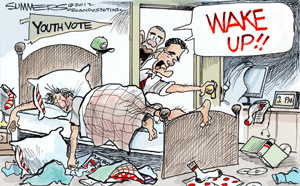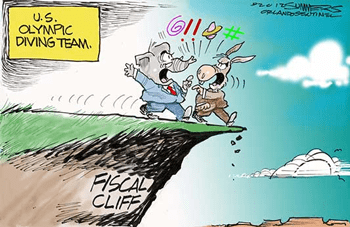Posts by Maegan Vazquez
The Young Politica: Why Be Politically Active After Elections
Now that the election is over, many young voters will likely retire their ‘concerned citizen’ badge until presidential primaries start up again. Being a politically active young person, however, is more than just voting for a president. There have been dramatic repercussion in the last four years due to youth voter inactivity between presidential elections.
In our own instant gratification generation psyche, many of us thought we had already created change by electing one man into the U.S. presidential seat. When it came to the midterm races in 2010, there was a 60% youth voter decline from 2008.
If more of us would have voted in 2010, perhaps there would have been tremendous changes. Perhaps the youth vote would have decided the election like it did in 2012.
Isn’t the rip-and-tear of the House over the past two years, all the ‘gridlock’, worth taking a stance?
Read MoreThe Young Politica: Dropping Down the Fiscal Cliff
Since the U.S. reached the debt ceiling in late 2012 and the country’s credit rating was downgraded for the first time in history, talks of reaching a fiscal cliff have loomed.
The fiscal cliff is a term used to describe what will happen after the start of the new year if there is no budget reform. If Congress does not reach a deal extending tax cuts by the time the Budget Control Act of 2011 goes into effect, taxes will be raised for anyone in the workforce. The result may be another recession.
How can it affect you?
If congress does not reach a deal, $661 billion in new tax hikes will start affecting your first paycheck (a two percent increase) after January 1st. On January 2nd, $78 billion in sequester hikes will begin cutting on some government and private sector workforces, likely causing layoffs and budget cuts.
How can this problem be solved?
Read MoreThe Young Politica: The Gender Gap’s Seven Percent
In a recent Forbes.com article, Meghan Casserly delved into the details of a recent study by the American Association of University of Women.
The study, which I covered briefly in an earlier column attempts to single out factors that may contribute to the wage gap (including the number of hours worked and the college major chosen).
It turns out that even after AAUW factored in choices that may have affected women’s pay, women still earn seven percent less than men counterparts one year after college.
Read MoreThe Young Politica: The Generational Communication Gap
In recent U.S. presidential elections, there has been a bipartisan effort to engage youth voters. The effort has been seen in candidates’ web/social media efforts, the recent upsurge of multi-party activism on campus, and the growth of youth organizations promoting youth political involvement.
It’s quite a change, given that we college students were more likely to be shooed away from the speaking platform in the 1960’s and 1970’s.
Read MoreThe Young Politica: The 2012 Youth Vote
After a low youth voter turnout in 2010, projections for the youth vote in 2012 seemed to be less than that of the momentous turnout in 2008.  Democrats made it a point to make the youth vote become an important factor in the 2008 election, but as many students, saw soon after inauguration day, change didn’t come as easily as we had expected. To many voters’ surprise, the youth vote was higher in 2012 than it was in 2008.
Democrats made it a point to make the youth vote become an important factor in the 2008 election, but as many students, saw soon after inauguration day, change didn’t come as easily as we had expected. To many voters’ surprise, the youth vote was higher in 2012 than it was in 2008.
Paul Ryan’s dig on fading Obama posters may have been a bit extreme, but it did shed light on the election’s youth voter’s perspective, and the voter climate overall. Would the next four years be worth the another Obama term? Would change for our generation be financially sustainable?
This election was far different from the 2008 election that promised some generic change. It wasn’t about who had the spiffiest graphics or best campaign t-shirts. It was about our future, about how much we would have to pay in loans after college, about what jobs we could find, and about what our futures would shape into.
Read MoreThe Young Politica: How to Vote During Hurricane
We Lower-Manhattanites are a scrappy bunch of people. We are starving artists, college students, writers, and Wall Street bankers. This past week, after Hurricane Sandy hit, all of lower Manhattan was out of power for days.
I am writing this after being evacuated from my dorm and living out of NYU’s Kimmel Center for days—a building that offered food, shelter, and power to students. For those not seeking refuge outside of their ‘South of Power’ apartments, I’ve heard stories of raw ramen for dinner and pilgrimages north for cell phone service. Luckily, power resumed for much of my neighborhood recently, so I have a bed to sleep in again.
Rather than thinking about where I would be relocated after the storm on Monday, my concerns shifted to how Sandy would affect the upcoming election. Perhaps my priorities need adjusting.
Read MoreThe Young Politica: The Wage Gap Starts Soon After You Receive Your Diploma
For many college-aged readers, loans are the reason we get the opportunity to get to college.  We spend thousands of dollars in virtual money to get an education in the hopes that it will begin to pay off as soon as we get a job. Yet, despite the fact that we advance in our career fields, it seems like women’s investments aren’t paying off as quickly as our male counterparts.
We spend thousands of dollars in virtual money to get an education in the hopes that it will begin to pay off as soon as we get a job. Yet, despite the fact that we advance in our career fields, it seems like women’s investments aren’t paying off as quickly as our male counterparts.
A recent report released by the American Association of University Women, Graduating to Pay a Gap, found that the pay gap persists and even begins soon after graduation
—“women one year out of college who were working full-time earned, on average, just 82 percent of what their male peers earned.”
It is important to note that even after variances like college majors, number of hours worked, and career industries were accounted for, women still earned less than men. One third of the gap cannot be explained by differences in education or unemployment, according to AAUW.
Read MoreThe Young Politica: Do the Presidential Candidates ‘Walk the Walk’ on Student Issues?
If you watched the presidential debate this past week, you probably remember Jeremy Epstein, a 20-year-old college student who attends Adelphi University. He opened up the town hall question session by asking:
“Mr. President, Governor Romney, as a 20-year-old college student, all I hear from professors, neighbors and others is that when I graduate, I will have little chance to get employment. Can — what can you say to reassure me, but more importantly my parents, that I will be able to sufficiently support myself after I graduate?”
This question is the basis of concern for many young Americans. And it correlates to other questions we have about student loans and the economy. In 2008, 51% of young voters came out to the polls and helped swing the vote. An overwhelming amount of students—68 %—voted for Barack Obama.
Now that there is some unrest on how he has handled the economy over the past four years, recognizing the student vote on both sides should be key to snagging the presidency. Here are some issues the candidates need to address:
Read MoreThe Young Politica: A Sudden Change in Voter’s Rights
Over the past six years, a new string of Voter ID laws has been pushed to legislation in 31 states. These laws require voters to show up with a valid ID at the polls.  Voter ID laws, along with laws that allow those in the military to vote early, have been under the national spotlight in recent months, despite being practically invisible to the media when they were first proposed. These laws are ever-transforming and some are still being amended—less than a month before the presidential election.
Voter ID laws, along with laws that allow those in the military to vote early, have been under the national spotlight in recent months, despite being practically invisible to the media when they were first proposed. These laws are ever-transforming and some are still being amended—less than a month before the presidential election.
There has been a recent push to delay Voter ID laws in many states until after the November election. It has been argued that this is the work of the Democratic Party’s agenda, because delaying these laws makes voting more accessible to the poor and the elderly; two groups which tend to vote Democrat.
Where are these changes happening and how will you be affected?
Read MoreThe Young Politica: Denver Debate Leaves College Students More Confused than Ever
At this point in the presidential race, students like myself do not have time to sift through crooked statistics and tired rhetoric. We have enough of those things on our plate already, considering that we’re reviewing for midterms.
Romney and Obama could have saved us the trouble. Most of the students I spoke with at New York University, which I attend, were already informed about the policy issues addressed during the televised train wreck. And those who were undecided said that they were still thinking through both policies because the debate offered little to them.
“I thought both candidates did an excellent job at talking their way around some key issues,” John Facey, a junior studying creative writing, said.
The candidates were just picking on each other like boys in the school yard. One friend likened Jim Lehrer’s authority to that of a high school substitute teacher: only after the fifth warning did the kids eventually settle down.
And just like almost every American who watched the debate on Wednesday, the student voter population was left scratching their heads once Lehrer finally called it a night.
Read More

